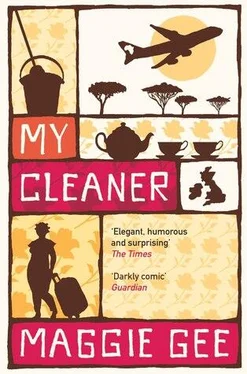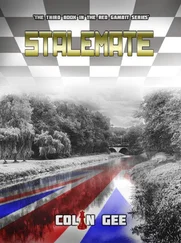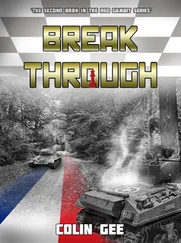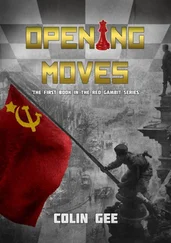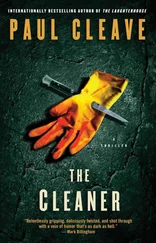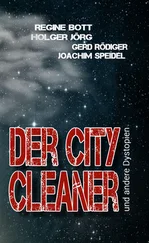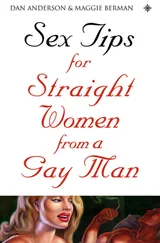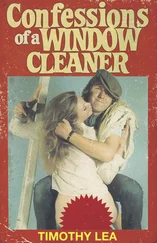“Have you bought Jamie a Christmas present?”
“Yes, I am always buying him presents.”
“Have you bought me a Christmas present?”
But Mary will not answer him.
Suddenly there’s movement, way up in the distance, and other engines fire into life, and under the shimmering scythings of snow, the whole scene shudders into motion again, but this time it’s a halting, wounded motion; the whole herd knows that for now, life has changed, survival has become part of the challenge.
“I need the bathroom,” Mary says, primly. “We’ll have to stop at a Services.”
Their progress is, to Justin, reassuringly slow. There is no more possibility of Mary speeding. The traffic flow moves in stops and starts, at 10 or 20 miles an hour, a great suffering, disintegrating caterpillar, assaulted from above by hordes of tiny white predators, and Mary and Justin desert the jerky caravan and move with a relative turn of speed down the road towards the blankness of the Services’ carpark. A field of churned snow, with a few white-fleeced cars crouched at random angles in the emptiness. The town is reverting to countryside. The world of machines is losing its grip.
Inside, the Services seem ghostly. The personnel have a haunted look that goes oddly with their coronets of tinsel, their fluffy reindeer ears, their enormous necklaces of glittery red and green Christmas balls. They stand and stare out of the plate-glass windows. “I’m only supposed to be on duty till nine,” a harassed-looking teenager confides in Mary. “But nobody’s thought about how I get home. I’ve got a baby waiting for me, you see.” She looks far too young to have a baby. “Where are you making for, anyway?”
Mary tells her, and the girl looks self-important. “Forecast’s like really crap,” she says. “Excuse my language. They’re saying, like, nobody oughtn’t to be driving tonight.”
“We shall be fine,” Mary says.
“Good luck,” the child calls after her.
But part of Mary is not sure she is fine. She sits in the ladies’ using her mobile. Mary has several people to contact, and does not want to do it in front of Justin. She needs to call Omar, though her heart is heavy. The phone calls to Libya have never been easy, hard to get a connection, hard to talk to Omar, but now there is the nagging fear of bad news. She needs to call her friend the accountant, to tell him where she is, and what is happening. She wants to tell him that she loves him, since she has never told him that she loves him, and perhaps she will never escape this place, this endless journey through corridors of ice, this long middle passage between two strangenesses, and even when she arrives, she will be far from home.
But first she must do what she dreads, and ring Omar. She shivers as she puts in the number, and manages to misdial three times. The line is appalling, racked with howls and moans. Her ex-husband is out, and Awatef seems distant. “He could not look for ever, Mary.” And so he came home. “Baghdad is still dangerous, do you understand?” The boy in the zoo had already moved on, and Omar could not even confirm he was Libyan.
Omar has come home, without Jamil. Without Jamil . Hope, drags, curdles.
“Mary, believe me, Omar has tried…but he must also look after his family.”
“Once he had another family,” says Mary, but Awatef doesn’t hear, and Mary doesn’t repeat it. Instead, she says, “Tell Omar I am sorry.” She is not surprised, but she shivers more severely, shaking so hard that her teeth knock together. So cold, so pitiless, this grey country. She sits and stares blankly at the concrete floor. Then she rings the number Vanessa has given.
“Mary! I have been mad with worry! Is Justin all right? What on earth has happened!”
The voice is broken up, it is fizzing with snow. Mary thinks that her little employer must be frozen. (But in fact, Vanessa’s sitting in Lucy’s front room, telling her cousin all about her life, cradling a large balloon of brandy that both of them agree they ‘wouldn’t have usually’. Fortunately Lucy is a good listener. Vanessa is having a lovely time. Lucy makes her feel glamorous. Now she in turn feels benign towards Mary. After all, poor Mary’s writing was a little old·fashioned, even though the agent did her best to be kind. Vanessa is the one who is tipped for success. She’s already drafting the blurb in her head—“a raw, riveting tale of rural lust …”)
“It is snowing, Vanessa, the road is not easy, but Justin is fine. He is eating chips and drinking his tea.”
“Where are you?” The voice sounds suspicious now.
“Crossroads Services, near Freemantle.”
“You’ve stopped at the Services? That will hold you up. I do hope you’re not going to get here too late.” There is a silence. Mary turns her eyes to the window shivering against the night, its glass shaking and straining in the wind, barely managing to hold back the wild white weather, the unfriendly distances of which Vanessa knows nothing.
Perhaps alerted by her silence, Vanessa tries again. “Of course the main thing is you’re both all right. It’s just that, you know, preferably , I’d rather you didn’t wake up Lucy.” She cocks one eyebrow at her cousin, who makes polite demurring faces: they mustn’t worry, it is quite all right.
“Yes, Miss Henman.”
“Oh really, Mary, by now you must have learned to say Vanessa.” She means it to be friendly, but it comes out wrong, as if she is saying that Mary is stupid, and Mary’s voice echoes back through the snow, muted, stubborn: “To say Vanessa. Yes, Miss Henman.”
“It isn’t actually snowing here,” Vanessa says, as if that makes it better. “But the forecast did say it was on the way. Isn’t it exciting, a White Christmas! You’ll be able to tell everyone in Uganda you had a real White Christmas with us!”
Then Mary starts to know she will not be going. A voice in her head says, Never, never . “Yes, Miss Henman. A White Christmas.”
(But where did that voice come from? Of course she must go. But it speaks to her again: Go home, go home .)
“Well anyway Mary dear, safe journey. Give my love to Justin. Kissy kissy kissy.”
Vanessa puts down the phone frustrated, but dramatizes it into a laugh, for Lucy. “That was Mary. Of course, my African friend. Yes, the heroine who saw off that infatuated student. We are very close now, but as you know, she was my cleaner for years and years. They don’t find it easy to be treated as equals. Even now Mary occasionally calls me Miss Henman. As if she were a child, and I the teacher!”
And Vanessa starts to glow with her own importance, the power of ruling and then renouncing, the touching affection Mary feels for her now, which “must mean I’m not completely ghastly!” She laughs at the absurdity of that thought. “She saved my life, Lucy, you know.” And then inspiration carries her along. “But I have been able to give something in return. Living in the house of an established writer has encouraged Mary to write about her life. Now I’ve put her in the way of a top literary agent. Of course in my job I have all the contacts. It isn’t certain she’ll be able to help her, but if Mary gets published, won’t it be wonderful?”
“Wonderful, wonderful,” says Lucy, yawning. “It’s very exciting, all these famous people. Now if you’ll excuse me, I’ll tear myself away and go up and finish wrapping my presents. I’ve left them out some ham and potato salad.”
Real snow starts falling, light and lovely, in the blank central space of the double-glazed window that Lucy has framed with spray-on snow and little bunny-scuts of glued cotton wool. “Oh isn’t it glorious, magical,” Vanessa enthuses, as Lucy goes to bed, and then settles down alone with a double gin, the TV controller, and a mug of cocoa. She feels heroic, waiting up for them.
Читать дальше
